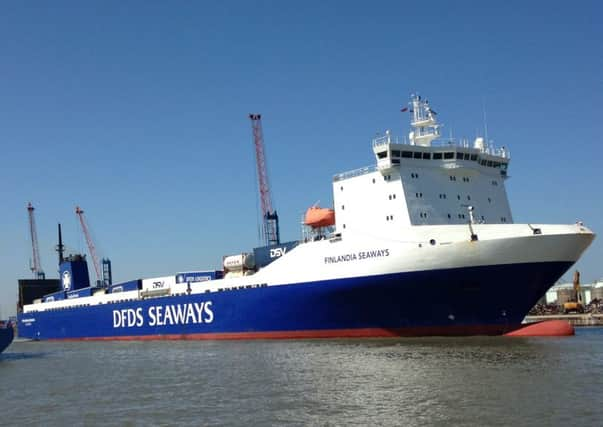Lorry traffic to increase due to rising ferry costs


DFDS said it would have to increase charges on its freight-only Rosyth-Zeebrugge route to pay for more expensive, greener fuel to comply with the regulations.
The Danish firm said it agreed with consultants who predicted this would lead to lorries travelling nearly one million extra miles a year on Scottish roads as hauliers switched to shorter ferry routes from English ports.
Advertisement
Hide AdAdvertisement
Hide AdMost of the additional traffic would be on the A1, which is largely single carriageway south of Dunbar, and the M74.
The problem would be made even worse should the ferry route close if it lost significant trade from the price increase.
DFDS has already announced the closure of two routes because of the cost of the changes, including the 139-year-old link between Esbjerg in Denmark and Harwich.
These have been triggered by the North Sea, Channel and Baltic becoming a sulphur emissions control area next January, where such pollution from ships must be cut from 1.5 per cent to 0.1 per cent.
Sulphur dioxide causes chest pains and breathing difficulties, particularly for asthma sufferers.
DFDS said it would switch from heavy fuel oil to low-sulphur marine gas oil, which is up to 50 per cent more expensive.
It said the alternative of fitting “scrubbers” to remove sulphur from ships’ exhausts was only suitable for half its fleet.
Chris Rowland of consultants MDS Transmodal, who co-authored a report on the impact of the change on the Fife-Belgium route, said: “The shippers and logistics companies which use the Rosyth-Zeebruge service would look for cheaper door-to-door routes to and from the continent.”
Advertisement
Hide AdAdvertisement
Hide AdThe report highlighted that switching fuel would make the ferries greener but they would lose one fifth of their traffic and lorry pollution, including harmful particulates, would increase.
It stated: “Our research suggests this will mean more trucks on the M74 and A1 as they choose to route more traffic via English ports.”
DFDS spokesman Gert Jakobsen said: “The increased costs will be a challenge for all ship owners and it will mean that in the future prices for sea transport will increase.
“There is no other way to do that but to send it to customers.”
Referring to the MDS Transmodal report, he said: “We agree with the statement that the new regulations will lead to increased traffic on the roads.”
Mr Jakobsen gave no commitment to the Rosyth route, but said DFDS “have no other plans for further route closures at the moment”.
However, Professor Alf Baird of Napier University, was more optimistic about the link’s prospects and downplayed the impact of the sulphur restrictions.
He said: “Most of DFDS traffic is containers, many of which might just shift across to Grangemouth, or onto rail.
Advertisement
Hide AdAdvertisement
Hide Ad“However I understand the traffic is now very good, so the route looks solid.”
The Scottish Government’s Transport Scotland agency declined to comment on impact of more lorries on the roads.
Its spokesman said: “The mode of transport for freight is a commercial decision.”
He added: “Scottish ministers fully recognise the importance of the Rosyth-Zeebrugge service and have worked closely with DFDS to help it in its efforts to build freight volumes on the route.”
The passenger service from Rosyth was scrapped by DFDS in 2010 following continued losses, less than two years after the ferry link was re-established by previous operator Norfolkline.
The route was originally launched by Greek operator Superfast in 2002, initially as a nightly service using two giant vessels, but it was later scaled back before being axed in 2008.